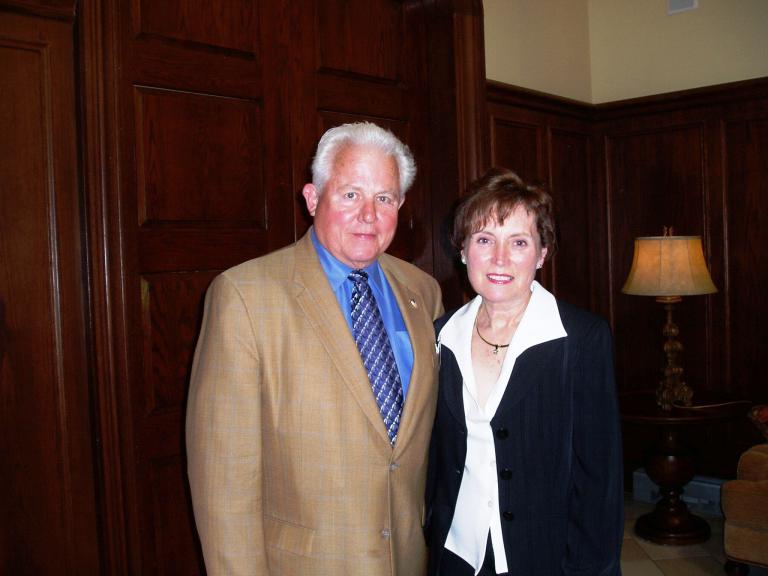
All their children are grown and have left the nest, but Vince Bandurski '64 and his wife Marilyn still have a nest full of babies to care for - about three clutches a year.
The Bandurskis raise black swans at their Grand Blanc home. "We're not in the business of raising swans per se," said Vince, who retired from General Motors in 2003 as executive director of Engineering Design for North America Product Development, "they just procreate at their own pace." Their female "is a great mama," said Marilyn, and very prolific, laying up to eight eggs three times a year.
The Bandurskis didn't intend to enter the swan raising business when they built their new home, but they had enough land for a pond and a number of neighboring properties with ponds had mute (white) swans.
Marilyn preferred the smaller black swans, a native of Australia, to the indigenous mute white swans, and they found a breeder in the Detroit area. "Since childhood I've been afraid of birds," said Marilyn, "I never would have considered having swans when I was younger."
Their first swan was a single female they named Sammie. Sam, the male, came a little later. "She's very docile," said Marilyn, "if the babies are newly hatched she might hiss at us," but normally Sammie is accepting of the Bandurskis' presence. Sam III however (the original Sam and Sam II both died), is fairly aggressive and takes his role as protector very seriously, especially when there are eggs or babies.
Even without eggs to protect, Sam III likes to exert his power. He will strut up to Vince and brush against him and step on his feet to show him who's boss. "I have to carry a plastic rake with me at all times if I'm in the yard," said Marilyn, "he catches me unaware and nips at me."
"He tolerates us," said Vince of Sam III, "he knows our cars and will kind of ignore us, but when strange cars come up the drive he does his best to protect her and the eggs or babies."
With up to three clutches of cygnets each year, the Bandurskis are kept busy helping Sammie hatch her babies. "If it's cold out we switch the newly laid eggs with wooden ones on a daily basis until they are all laid, and then we put them back in the nest," said Marilyn of the eggs that have to be kept at 100 degrees to become viable cygnets.
Sammie lays one egg every other day until there are about eight eggs and then sits on the nest full time. If the Bandurskis didn't take the eggs in the house during cold weather and until Sammie sits full time, very few, if any, would hatch.
After laying, Sammie sits on her nest full time, or Sam III does while she feeds and bathes. The Bandurskis have constructed a house for them to nest in and secured a small pen to keep out night time predators. Despite being laid over a period of 16 days, all the eggs that are going to, hatch within 24 hours of one another. "Usually five or six hatch," said Vince, "only once did all eight hatch."
"All I wanted were two black swans to swim in the pond," said Marilyn, "and lately all we're doing is monitoring the laying, hatching and babysitting!" Vince will be primary babysitter to the clutch currently in the nest now that Marilyn, a registered nurse, has gone back to work at Grand Blanc High School, where she teaches medical occupations.
In contact with the Michigan Bird Breeders, the Bandurskis sell each clutch to others interested in having black swans. "We recommend they buy their males and females from different breeders to avoid inbreeding," said Vince. Some buyers purchase a pair from the Bandurskis and then swap one of their pair with someone else. Bandurski black swans have wound up as far away as California.
Although they won't admit it, the Bandurskis are becoming something of experts on black swans and their care. All those hours they have logged helping egg sit and being chased around the yard have given them a wealth of knowledge about the birds and their habits.
"There has not been a lot written about black swans in this country," said Vince, "we've had to pick things up where we can." Some lessons come hard, like the little cygnet that couldn't quite break through his egg shell. They gave him a hand getting out, but noticed he never grew much, always looking like a baby while his siblings grew into cobs and pens. A few months after hatching "Peanut" was diagnosed with a heart condition and died. "We learned he never would have gotten out the egg without help because of his weak heart," said Marilyn, "if they are not strong enough to break out of the egg themselves then they're not going to live."
It's the big things like successful hatching and habitat management, and the little things like figuring out lettuce is the equivalent of swan candy, that give the Bandurskis an edge as swan stewards. And also net them some wonderful photos and great stories to tell about living with these beautiful birds.
Written by Dawn Hibbard
810-762-9865
dhibbard@kettering.edu